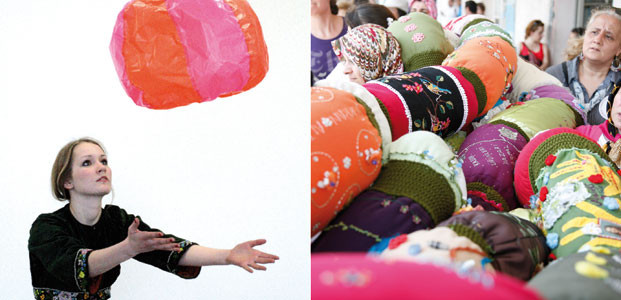Antje Majewski | Mathilde Ter Heijne
30 Apr - 18 Jun 2011
ANTJE MAJEWSKI | MATHILDE TER HEIJNE
30 April - 18 June, 2011
Only truely quixotic minds may still believe there exists a sublime realm of art beyond any capitalistic exploitation interests. At the same time, art still stands for the dissenting »other«, for breaking new and unusual grounds also including concepts of other social systems and economies. Almost like an ethnologist, Mathilde ter Heijne explores matriarchal systems that are not based on hyrarchies but on network structures avoiding exchange economies in favour of unilateral enrichment.
The project by Mathilde ter Heijne with the title „Olacak!“, in English „it will be fine“, tests her artistic exploration in the field. It is a collabration with 75 Turkish women who all belong to the 1986 founded „Foundation for the Support of Women’s Work“. Their aim is to improve the life and economic situation of women. Which also includes featuring the women’s skills in independent craft work. Since the beginning of 2010 products made by women are offered on an own market in the outskirts of Istanbul. Here happened also the first festive presentation of a thirty metre long snake to which all the women contributed with their respective skills. In this way, a collective art work emerged which is, at the same time, a kind of ritual object symbolising the uniting and liberating power of joint work.
When the snake is carried through the crowd as in a procession, in the »procession« in Antje Majewski’s film with the same title four girls are by themselves. Also here it is about a form of self empowerment, about free role play, playing with clothes and requisites, teenager emphatize through play with the role of the adult woman. It is some kind of continuation of „Teenage Pantomime“ (2002), a series of photographs published as a book, which Antje Majewski took as a teenager of the sometimes pretty crazy costumes and masquerades that her sister and she obviously had fun with. The actors of „Prozession“ are, so to say, the next generation, the niece of the artist and her friends. They wear colourful, sequined dresses, as well as, colourful paper objects that are finally placed into the water like »sacrifices«. In various cultures exists the old ritual to pass paper objects to the water. They can be presents for a goddess of the sea or serve in rememberance of the dead. The storyline and single actions, whose perfomance the girls mainly determined themsleves, doesn’t follow a ritual or religious »purpose«. They are mainly based, like the role playing and (fancy) dress game, on the approval of joint action which in particular helps enhance the joy of life beyond defined goals and exploitation interests. In this sense, the paper objects Antja Majewski created, and thus are considered as proper »works« of the artist, are not fed into the art market. The passing on to the water represents, economically speaking, a deliberate waste.
Ludwig Seyfarth
30 April - 18 June, 2011
Only truely quixotic minds may still believe there exists a sublime realm of art beyond any capitalistic exploitation interests. At the same time, art still stands for the dissenting »other«, for breaking new and unusual grounds also including concepts of other social systems and economies. Almost like an ethnologist, Mathilde ter Heijne explores matriarchal systems that are not based on hyrarchies but on network structures avoiding exchange economies in favour of unilateral enrichment.
The project by Mathilde ter Heijne with the title „Olacak!“, in English „it will be fine“, tests her artistic exploration in the field. It is a collabration with 75 Turkish women who all belong to the 1986 founded „Foundation for the Support of Women’s Work“. Their aim is to improve the life and economic situation of women. Which also includes featuring the women’s skills in independent craft work. Since the beginning of 2010 products made by women are offered on an own market in the outskirts of Istanbul. Here happened also the first festive presentation of a thirty metre long snake to which all the women contributed with their respective skills. In this way, a collective art work emerged which is, at the same time, a kind of ritual object symbolising the uniting and liberating power of joint work.
When the snake is carried through the crowd as in a procession, in the »procession« in Antje Majewski’s film with the same title four girls are by themselves. Also here it is about a form of self empowerment, about free role play, playing with clothes and requisites, teenager emphatize through play with the role of the adult woman. It is some kind of continuation of „Teenage Pantomime“ (2002), a series of photographs published as a book, which Antje Majewski took as a teenager of the sometimes pretty crazy costumes and masquerades that her sister and she obviously had fun with. The actors of „Prozession“ are, so to say, the next generation, the niece of the artist and her friends. They wear colourful, sequined dresses, as well as, colourful paper objects that are finally placed into the water like »sacrifices«. In various cultures exists the old ritual to pass paper objects to the water. They can be presents for a goddess of the sea or serve in rememberance of the dead. The storyline and single actions, whose perfomance the girls mainly determined themsleves, doesn’t follow a ritual or religious »purpose«. They are mainly based, like the role playing and (fancy) dress game, on the approval of joint action which in particular helps enhance the joy of life beyond defined goals and exploitation interests. In this sense, the paper objects Antja Majewski created, and thus are considered as proper »works« of the artist, are not fed into the art market. The passing on to the water represents, economically speaking, a deliberate waste.
Ludwig Seyfarth

